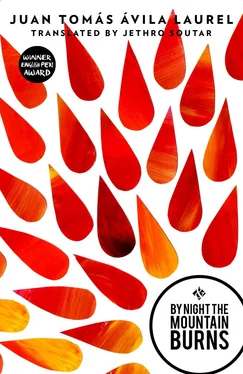Juan Ávila Laurel - By Night the Mountain Burns
Здесь есть возможность читать онлайн «Juan Ávila Laurel - By Night the Mountain Burns» весь текст электронной книги совершенно бесплатно (целиком полную версию без сокращений). В некоторых случаях можно слушать аудио, скачать через торрент в формате fb2 и присутствует краткое содержание. Год выпуска: 2014, Издательство: And Other Stories Publishing, Жанр: Современная проза, на английском языке. Описание произведения, (предисловие) а так же отзывы посетителей доступны на портале библиотеки ЛибКат.
- Название:By Night the Mountain Burns
- Автор:
- Издательство:And Other Stories Publishing
- Жанр:
- Год:2014
- ISBN:нет данных
- Рейтинг книги:5 / 5. Голосов: 1
-
Избранное:Добавить в избранное
- Отзывы:
-
Ваша оценка:
- 100
- 1
- 2
- 3
- 4
- 5
By Night the Mountain Burns: краткое содержание, описание и аннотация
Предлагаем к чтению аннотацию, описание, краткое содержание или предисловие (зависит от того, что написал сам автор книги «By Night the Mountain Burns»). Если вы не нашли необходимую информацию о книге — напишите в комментариях, мы постараемся отыскать её.
By Night the Mountain Burns — читать онлайн бесплатно полную книгу (весь текст) целиком
Ниже представлен текст книги, разбитый по страницам. Система сохранения места последней прочитанной страницы, позволяет с удобством читать онлайн бесплатно книгу «By Night the Mountain Burns», без необходимости каждый раз заново искать на чём Вы остановились. Поставьте закладку, и сможете в любой момент перейти на страницу, на которой закончили чтение.
Интервал:
Закладка:
They went with sticks to knock on the woman’s door. She was there with her daughters. The ministrant’s relatives accused her, said the words they’d kept in their hearts, then started to beat her. They did so full of rage, full of fury, and they perhaps intended to finish the matter right there, for they didn’t want the whole world to see what they were up to, something that had never been done on the island before. But the woman didn’t want to die, so she ran out of the house, a house in which she’d had no sons, nor daughters who’d married, but rather two daughters who’d had children with men who lived elsewhere. She went out to seek protection from Toiñ, who was relaxing at the vidjil . By the time she got to the vidjil , she was bleeding profusely, and she left trails of blood in the streets where she ran, chased like a dog that had jumped from the tree at the first stone thrown by a child. She cried, she begged to be pardoned, she pleaded for mercy from everyone in the village, from her pursuers, the ministrant’s entire family. After fending off so many blows, her fingers must have been broken. But she could still run. If she managed to reach the vidjil it was only because the blows hadn’t yet ruined her feet. She panted, sweated, bled profusely. And she entered a place that women rarely entered. She saw that she was going to die and she thought her husband, Toiñ, would be able to defend her. What’s more, the vidjil was a place where important things on the island were judged. It was a place where there were always lots of men during the day and those men would ask what the whole thing was about, for chasing and killing a woman, in fact chasing and killing anyone at all, had never happened on the island before. And she would make the most of the men asking questions and establishing facts in order to rest, to wipe the blood from her face, rub the bumps on her head and hope the men in the vidjil would manage to convince that family that the matter should be discussed and resolved in a different fashion. She ran bleeding into the vidjil . But the men there didn’t know what she expected them to do, and when they saw the blows that cracked the bones of her companion, Toiñ, they realised the situation was more serious than they’d first thought. And they expelled the woman from their vidjil , and they told Toiñ that he must trust in Dios , for they themselves could do nothing. Although they didn’t say as much in words, rather with their actions. Who knows what they really thought. She bled a lot but, with great effort, she accepted the double blow of discovering Toiñ’s weakness and the vidjil ’s cowardice. I think that, of the whole business of running through the streets trying to escape death, being turned away from the vidjil must have been some kind of nadir. If things had worked out differently, it could have led to a powerful sense of relief. Salvation from death’s shadow. But instead it led to her surrender. Can it not be said that by going into the church she was handing over responsibility for her life to whoever was in there? Yes, I know she was given Communion after she confessed, but I can’t ignore the fact that the priest was a man with great authority on the island. Someone with a voice. Then came what I could not bear to watch. She went on bleeding and she died, all the strength having run out of her. Her soul ripped out of her body as it was beaten with sticks by members of the senior ministrant’s family. The ground was covered in blood, and I know it wasn’t the people who beat her who carried her dead body back to the house to prepare her for burial. That’s how this was different from killing a dog when it becomes a burden: the dead dog’s killers don’t leave the body on the ground for someone else to deal with.
What motivated them to do what they did? I’ve already said. It was what the family members kept in their hearts, which were the dying words of the ministrant. The morning he died, that woman, the wife of Toiñ, a man who spoke so slowly and softly, that woman, who was a she-devil, left her house and followed the ministrant; when she saw him climb the palm tree, she made him fall using the black magic she’d learned from the being that visited her at night. She was a she-devil, so when everyone else slept in their beds at night, she started to feel suffocating heats, she took off her clothes, opened the door to her house and ran down to the beach to bathe in the sea. And if neither her husband nor her two daughters, the two sisters who caused the fire on the Pico, had ever seen her do this, or were even aware that it happened, how could they be blamed for what she did? The daughters had never noticed the terrible thing that happened to their mother at night. They were totally unaware of it. They weren’t she-devils themselves and they were oblivious to her having been one. And maybe that’s why they didn’t believe in the reasons the ministrant’s family had for doing what they did. They were not she-devils and they could not understand how a woman who had not gone up the palm tree and grabbed hold of the harness and thrown the man out of the tree could be said to have caused the accident. But they did not know what someone visited by a strange being in the night is capable of. When did she take her clothes off? Before the visit? Afterwards? As far as the senior ministrant’s sons and daughters were concerned, their father had been followed by the she-devil and, if she hadn’t been seen there in person, it was because she’d caused the accident that killed him by using her black magic. If the senior ministrant had seen her in person before he climbed that palm tree, he wouldn’t have climbed it. He’d have gone home and waited for another day. But she-devils don’t always let themselves be seen, and it’s possible the man didn’t even know he’d been followed that morning, for he might never have looked over his shoulder. On our island, any woman being followed by a she-devil would have realised it, for she would have felt a ‘weighing’ at her back and she would have stepped aside to allow the she-devil to pass. This I know from my grandmother. She was once on her way to the plantations with one of her grandsons when she felt someone staring at her with great intensity. She looked over her shoulder and saw a woman coming, a woman who people talked about on account of her suspicious behaviour. So my grandmother stepped aside to let the woman pass, but the woman refused to go on ahead and stepped off the path herself, as if to pee. She remained standing but she lifted up her clothes, put her hand between her legs and let out her stream, or at least it’s assumed she did. Everything on the paths to the plantations is governed by rules of courtesy, so my grandmother didn’t wait and watch, rather she went on walking, with the boy out in front. What a cheek that woman had. For this behaviour alone she deserved a reprimand; it truly was suspiciously she-devilish behaviour. They went on walking and my grandmother felt the weighing at her back again but, whenever she stopped, the other woman refused to pass. When they reached a fork in the path, my grandmother called the boy back, for he’d gone on ahead as he knew where they were going. But my grandmother decided to take another route and follow a path that led to a place where there were no plantations. She’d therefore never been down that path before. She was only taking it to escape the other woman’s harassment. As the path forked, my grandmother veered off to the right, while the other woman went straight on. But after a certain time had passed, my grandmother felt the weighing and the harassment again, very strongly, and she knew that other woman had evil intentions. Not wanting the day to be spoiled, my grandmother told the boy to stop, and they turned round and headed in the opposite direction, to a totally different plantation, one she hadn’t thought of going to that morning.
Читать дальшеИнтервал:
Закладка:
Похожие книги на «By Night the Mountain Burns»
Представляем Вашему вниманию похожие книги на «By Night the Mountain Burns» списком для выбора. Мы отобрали схожую по названию и смыслу литературу в надежде предоставить читателям больше вариантов отыскать новые, интересные, ещё непрочитанные произведения.
Обсуждение, отзывы о книге «By Night the Mountain Burns» и просто собственные мнения читателей. Оставьте ваши комментарии, напишите, что Вы думаете о произведении, его смысле или главных героях. Укажите что конкретно понравилось, а что нет, и почему Вы так считаете.












